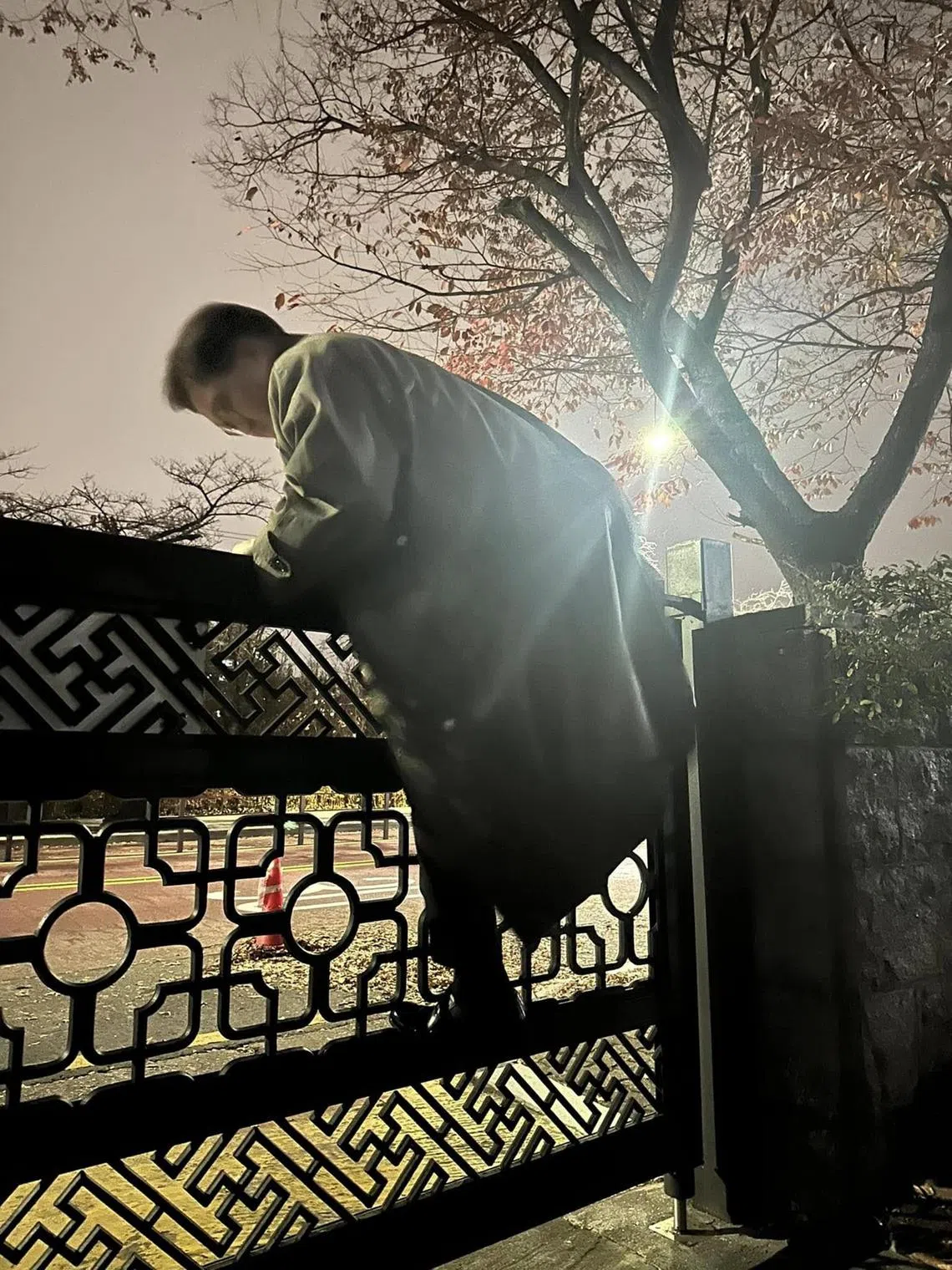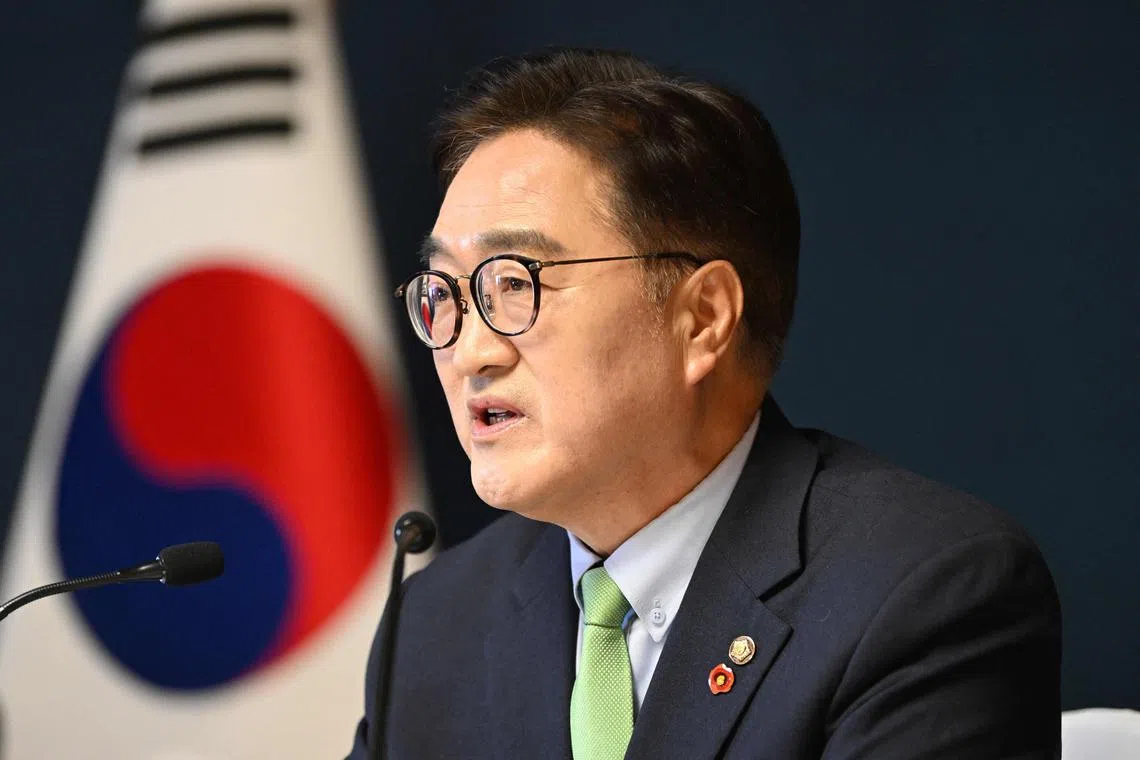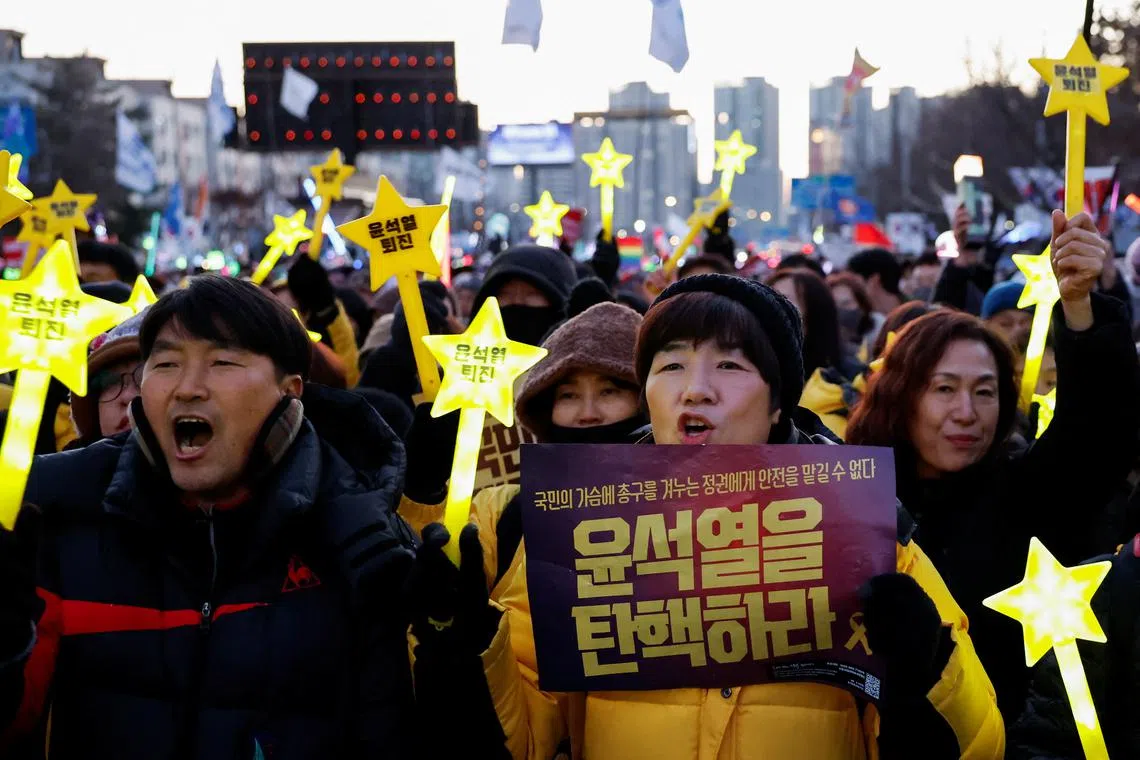SEOUL – Amid the political storm in South Korea whipped up by a short-lived martial law attempt on Dec 3, one man has emerged as a hero of the people.
Images of South Korean National Assembly Speaker Woo Won-shik banging the gavel as he presided over the legislature’s overturning of the martial law declared by President Yoon Suk Yeol and two subsequent impeachment motions against the President, have earned him the nickname “Thor”, in reference to the hammer-wielding Marvel superhero.
The first motion on Dec 7 failed because there were not enough votes, but the second one on Dec 14 went through.
Mr Woo’s calm leadership of the fractured National Assembly during the martial law and impeachment turmoil has won the hearts of many South Koreans, who voted him the most trustworthy politician in a survey released on Dec 13.
Mr Woo scored 56 per cent in the survey, while opposition leader Lee Jae-myung scored 41 per cent and acting President and Prime Minister Han Duck-soo 21 per cent.
This popularity could propel him into the highest echelon of power in South Korean politics.
Mr Woo’s name is now being floated as one of the possible presidential candidates should a snap presidential election be called in the first half of 2025.
The Constitutional Court has 180 days from Dec 14 to mull over whether to uphold or reject the impeachment of Mr Yoon. If it is upheld, elections for a new president have to be called within 60 days.
When asked about his interest in the race at a recent press briefing, Mr Woo gave a faint smile before replying: “I had wanted to be Speaker and I fought a fierce election before I was appointed. My term only ends in May 2026, and I have not given any thought to the presidential race at this point.”
More immediately, he intends to use his position to push for constitutional amendments to reduce the powers of the presidency and increase those of the National Assembly, in the aftermath of the martial law attempt.
The 67-year-old Speaker was among the first to rush to the National Assembly on the night of Dec 3, even scaling a gate to get in, as police had blocked access to the compound soon after Mr Yoon’s shock declaration of martial law.

Mr Woo, 67, scaling a gate in a bid to enter the National Assembly grounds on the night of Dec 3.PHOTO: WOO WON-SHIK/FACEBOOK
Recalling the 1980 student uprising in Gwangju against martial law rule under then leader Chun Doo-hwan that left hundreds dead, Mr Woo said he felt the responsibility to stop such a tragedy from happening again, at the press conference on Dec 19.
Chun was an army general who seized power and declared martial law after the assassination of president Park Chung-hee in 1979.
“Military soldiers trampling on the human rights of ordinary citizens... the sacrifices of Gwangju citizens in 1980 came to my mind, that was why I did not hesitate to climb over the gate,” Mr Woo said.
Mr Woo knows the harsh reality of martial law first hand, having served three years in prison from 1981 to 1984 for his student activism against the brutal regime under Chun.
“The National Assembly is the last bastion of our democracy,” he said, adding: “If (martial law) is ever called again, I will climb the gate a second time.”
The Speaker had held the rare press briefing in response to media interest in him following the surge in his popularity.
Declining to take the credit for his popularity, Mr Woo said that it was the hard work of his fellow National Assembly members, advisers and staff that allowed the lawmakers to overturn the martial law decree in less than 2½ hours on Dec 4.
Noting that South Koreans do not hold the National Assembly in high regard, Mr Woo said he now feels a responsibility to maintain the renewed interest in the legislative body and to fulfil the expectations of the citizens.

Mr Woo said he now feels a responsibility to maintain the renewed interest in the legislative body and to fulfil the expectations of the citizens. PHOTO: AFP
A public survey conducted in 2023 ranked the 300-member legislature as the least trusted out of 16 public institutions. The mistrust is said to stem from the people’s frustrations over the deep polarisation of the ruling and opposition parties and perceived disconnect between lawmakers and their mostly elite backgrounds and the common people.
In his defence of his martial law debacle, Mr Yoon had blamed the opposition-dominated National Assembly as a “legislative dictatorship” that paralysed state affairs and disturbed social order.
Mr Yoon, who has been suspended from duties since his impeachment, had asserted in a public address on Dec 12 that his decision was meant to warn the public about the opposition’s “heinous anti-state behaviour” and that he was only trying to restore constitutional order.
But, Mr Woo said, the way Mr Yoon chose to do so was bad misjudgment on his part.
“South Korea is an advanced democracy in the year of 2024, there are many tools that we can use to communicate with one another, but Mr Yoon chose the one tool (martial law) that was last used 45 years ago, it is just absurd!” he said.
The Speaker expressed disappointment that the President did not attempt to engage the lawmakers, something that is unprecedented for a South Korean president.
Mr Yoon became the first president in South Korea’s history to skip the inauguration of a new Parliament, formed in September, after his ruling People Power Party suffered a massive defeat in the April general election.
A presidential aide had told reporters at that time that Mr Yoon refused to be humiliated at a time when the dominant opposition kept pushing for impeachment and special prosecution Bills against his wife Kim Keon Hee and other senior officials close to him.
Mr Woo said: “It is natural for a leader to have opponents with divergent views, so this is why Mr Yoon needs to make efforts to persuade people to understand his views, he needs to engage with his opponents, but he hasn’t done so.”
He added that he had asked several times to meet Mr Yoon but received no response.
The Speaker is now advocating for the Constitution to be amended as he believes the president currently holds too much power and that more authority should be given to the National Assembly for checks and balances.
But of more urgent priority on his agenda is to restore the faith of the international community that South Korea’s democracy is strong and resilient enough to weather the current political upheaval.
Apart from sending out letters to his counterparts around the world, Mr Woo intends to dispatch bipartisan delegations to various countries to explain the situation and the country’s recovery plans.
He expressed regret over the series of high-level visits that had to be cancelled in the wake of the martial law crisis, and said that his team was working to welcome visitors soon.
Singapore’s Speaker Seah Kian Peng was among those who had to cancel his visit to Seoul because of the political turmoil.
At the end of the press conference, when asked by The Straits Times if the visit was back on track, Mr Woo smiled and said: “Soon!”
Join ST's Telegram channel and get the latest breaking news delivered to you.

 By The Straits Times | Created at 2024-12-21 04:49:20 | Updated at 2024-12-21 08:00:28
3 hours ago
By The Straits Times | Created at 2024-12-21 04:49:20 | Updated at 2024-12-21 08:00:28
3 hours ago








